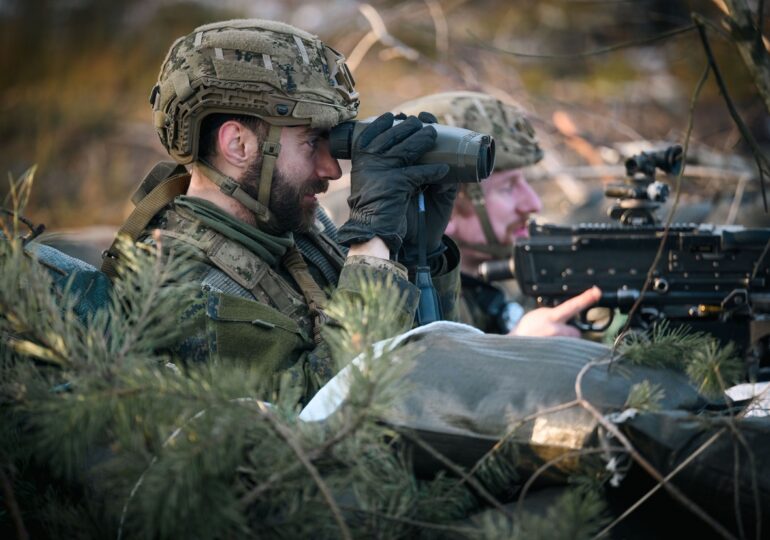Warnings about a possible Russian attack on a NATO state are increasing. Experts are analyzing the seriousness of this risk.
German Defense Minister Boris Pistorius warned, in an interview published Saturday by Frankfurter Allgemeine, that Russia could start a war with NATO as early as 2029 – or even earlier, according to some experts. In response, the spokesperson for the Russian Foreign Ministry, Maria Zakharova, stated that „there is no doubt about who the aggressor is,” while the Kremlin spokesperson, Dmitry Peskov, added that Russia „might be forced to take measures to ensure its security.”
Meanwhile, several independent Israeli military analysts have suggested that Moscow could attempt to seize territories in the Baltic states as early as next year, testing Article 5 of NATO in order to strengthen its bargaining position with the US. They have identified the Suwałki Corridor - a narrow strip of land between Belarus and the Russian exclave of Kaliningrad, connecting Poland and Lithuania - as the region with the highest risk.
The corridor is considered the most vulnerable point of the Baltic countries, as it is the only land route connecting the region to the rest of continental Europe.
The platform Current Time has published a synthesis of analyses by several experts on this topic.
Why is Russia focused on the Suwałki Corridor
According to military analyst Sergei Auslender, Russia could carry out "a limited operation with rapid results" to put NATO in a very difficult position and then use this to negotiate the terms of a peace agreement in Ukraine.
"Capturing part of NATO territory, such as the Suwałki Corridor, for example, would also solve the problem of supplying Kaliningrad by land," he mentioned.
The Suwałki Corridor, a strip of land around the Lithuanian-Polish border, is often described as NATO's Achilles' heel. A few years ago, Politico called it "the most dangerous place on Earth". NATO has increased its focus on the area and regularly conducts exercises there, but some analysts are not convinced this is enough.
"There are about 10,000 NATO troops stationed in the Baltic states today. It's not much, but certainly wouldn't be able to counter a large-scale invasion," said military analyst Grigory Tamar. "If we are talking about a 'special operation,' these bases could simply be blocked. In such a scenario, it is hard to imagine that NATO forces could make a heroic leap to defend anyone there. At best, (the Baltic countries) would defend themselves."
How could a Russian attack begin
Several experts have noted that Russia could precede any attack with references to "protecting Russian speakers." Over 850,000 ethnic Russians live in Lithuania, Latvia, and Estonia, mostly in border regions near Russia and Belarus.
"First, they organize a campaign claiming that Russians are oppressed in Estonia. Then, they arrange for an organization representing Russians in Estonia, for example, to draft a letter requesting protection. This creates a pretext for an invasion. They wouldn't wait for a pretext; they would invent one," said Auslender.
Lithuanian military expert Darius Antanaitis (major in reserve) argues that, under current conditions, a new war would be difficult, as the Baltic Sea has practically become a "NATO lake" since Sweden and Finland joined the Alliance.
"To approach the Lithuanian coast, they wouldn't rely on the naval forces of Kaliningrad - they would need the Baltic Fleet, which must depart from St. Petersburg. And to get out of there, they need to secure a safe passage through the Gulf of Finland, which has Finland on one side and Estonia on the other. This means the war would have to start there. To block us in the Baltic Sea, they would need to occupy Gotland Island," Antanaitis pointed out.
Could 2027 be the year of the Russian invasion?
General Richard Shirreff, former Deputy Supreme Allied Commander Europe, has warned that Russia could launch a large-scale war in the Baltic countries as early as 2027, a concern reiterated by Danish intelligence reports.
However, former Lithuanian Defense Minister Laurynas Kasčiūnas has expressed skepticism about this forecast. "I wouldn't necessarily expect that in 2027. It all depends on how the war in Ukraine unfolds - how long the Ukrainians will continue to fight, if there is a ceasefire, and if sanctions are lifted," he said.
In his view, "there are simply too many unpredictable factors" to make a prediction about a Russian attack. "For now, the assumption is that Russia couldn't wage two wars at the same time. That's a fact. They simply can't open a second front."
At the same time, Russian analyst and blogger Dmitry Chernyshev has warned against underestimating Moscow's readiness to act aggressively.
"Putin's military economy is running at full capacity; he is less afraid of war than of peace. When the entire pyramid he has built collapses, hundreds of thousands of armed soldiers will return from the front, and there will be nothing left to justify reprisals. (...) Putin always acts the same way - in a difficult situation, he doubles his efforts to have something to negotiate with."
Commander of the Lithuanian Armed Forces Raimundas Vaikšnoras assesses the risk of a Russian attack in the Baltic countries in relation to the outcome of the war in Ukraine. According to him, the result of this conflict will likely determine Moscow's next moves.
T.D.

